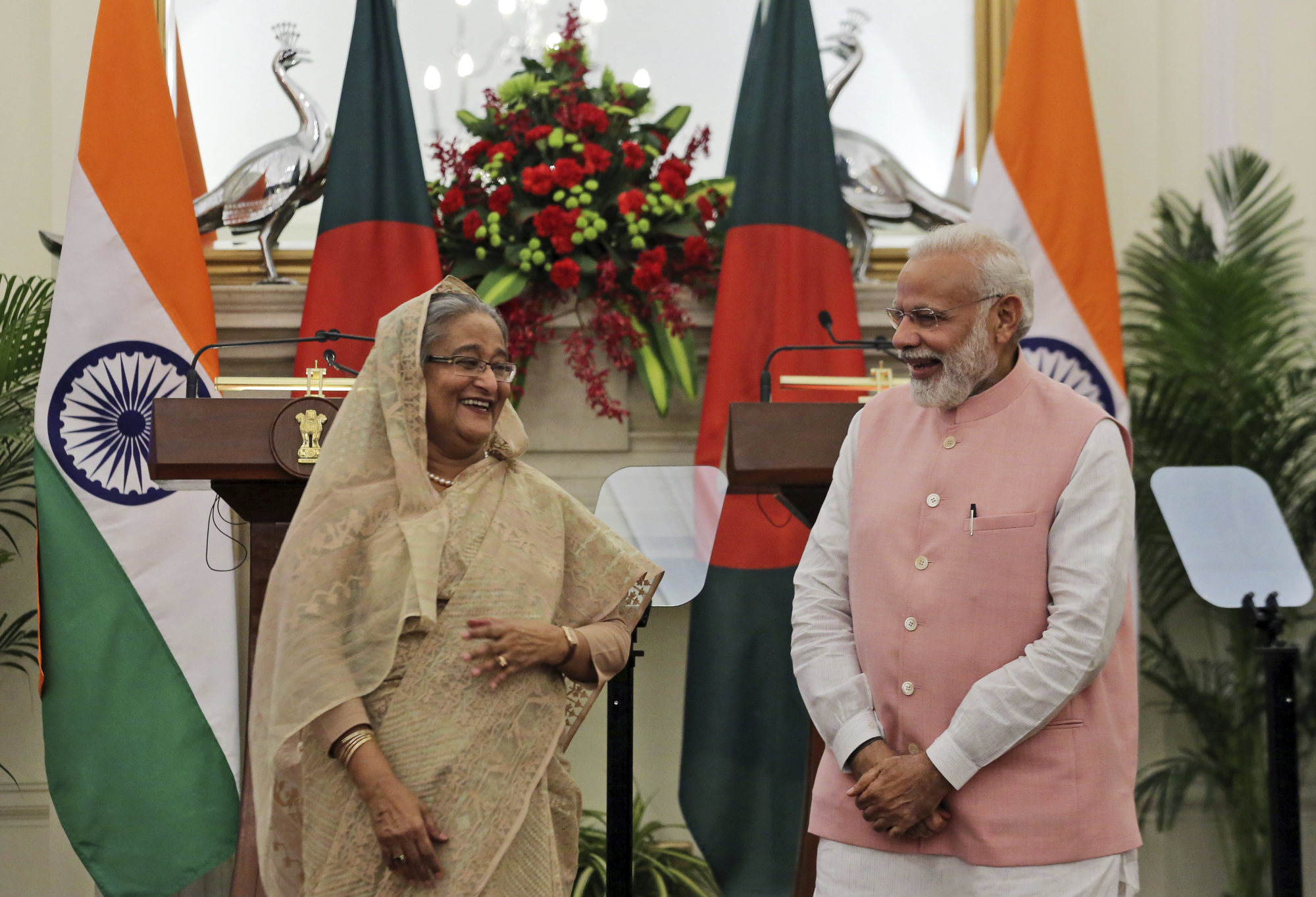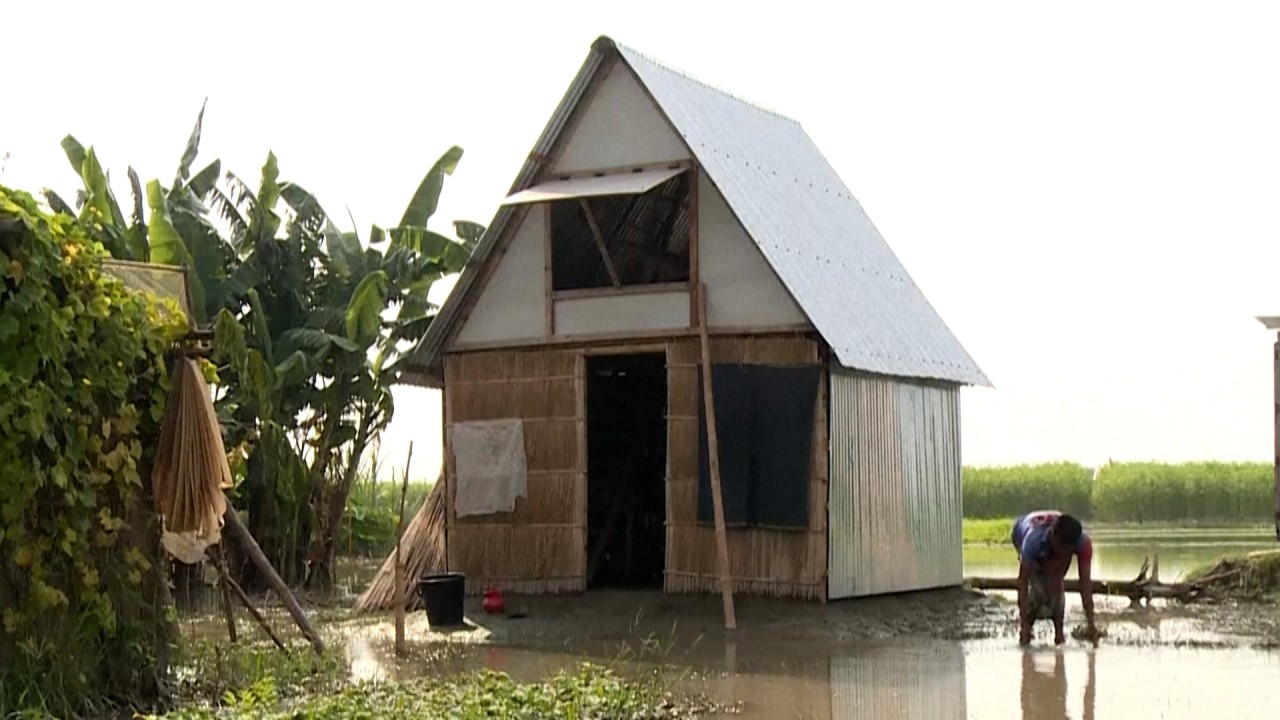
Bangladeshis launch ‘India Out’ campaign over New Delhi’s alleged meddling to keep Hasina in power
- The Bangladeshi opposition claims Hasina’s Awami League has won the past three general elections ‘all because of India’s support’
- The economic impact is not clear-cut as Bangladesh imports many goods from its neighbour while India’s export base is diversified, an economist says
The campaign is mainly being driven on social media, and hashtags #IndiaOut, #BoycottIndia and #BoycottIndianProducts have been trending on Facebook in recent weeks. Some opposition political groups also took part in rallies on the street in cities, in support of the movement.
Exiled Bangladeshi activist Pinaki Bhattacharya, one of the architects of the India Out campaign said Hasina’s Awami League managed to overwhelmingly win three “one-sided sham” general elections over the past decade, “all because of India’s support”.
“Hasina’s government has long been the beneficiary of Indian interventions in the internal politics of Bangladesh. It comes as no surprise that the anger of the Bangladeshi public, which was previously aimed at the regime of their own nation, is now directed towards India,” Paris-based Bhattacharya told This Week in Asia.
“The people of Bangladesh have launched this campaign to express their extreme discontent with India.”
Hasina’s win ‘nail in the coffin’ for Bangladesh’s democracy as troubles loom
In 2014, a one-sided general election took place in Bangladesh with the Bangladesh Nationalist Party (BNP), the largest opposition party in the country, boycotting it. In 2018, the general election was marred by widespread allegations of ballot-stuffing by the ruling party.
Since 2022, the US and other countries have repeatedly urged the Hasina government to conduct the next general election freely and fairly.
Responding to a call from the opposition, around 60 per cent of voters did not cast their votes in what it termed a “farcical election”.

As almost all 300 seats contested were won by the ruling AL-led alliance and pro-ruling party “independent” candidates, activists and analysts claimed the election marked the death of democracy and portended increased political instability.
The US State Department meanwhile said in a statement that last month’s election in Bangladesh had not been “free or fair”.
Hasina has been credited for overseeing an economic revival in Bangladesh that has seen the nation rise to become one of the strongest economies in South Asia. But her terms in office have also led to democratic backsliding and what is seen as increasingly authoritarian and repressive measures against dissent or political opposition.
Anti-India tensions boil
Anti-India sentiment has been simmering in Bangladesh for the past decade since the Hindu nationalist Bharatiya Janata Party led by Prime Minister Narendra Modi ascended to power in India.
In 2021, people in Muslim-majority Bangladesh demonstrated on the streets against Modi’s visit to Dhaka as the chief guest at the country’s golden jubilee celebrations of independence.
Protesters said he was unwelcome in Bangladesh and called Modi the “Butcher of Gujarat” – referring to the 2002 anti-Muslim programme in the western Indian state in which more than 1,000 people, mostly Muslims, were killed.
India keen for Bangladesh PM to hold power amid China’s ‘advantageous position’
The anti-Modi protesters ended up fighting with police and at least 13 were killed in shootings.
Anti-India sentiment flared up again last year when Bangladeshis publicly celebrated India’s loss to Australia in the Cricket World Cup final at the Narendra Modi Stadium in Ahmedabad.
In recent weeks, India Out has been launched with those behind the campaign alleging India’s interference in Bangladesh politics. The latest Bangladeshi movement drew its inspiration from a recent campaign in the Maldives, that helped Mohamed Muizzu capitalise on anti-India sentiment and win the presidency in November.
Many Bangladeshis said on Facebook in the past weeks that they have stopped buying Indian goods, urging other fellow citizens to follow suit. Bangladeshis are posting photos of crossed-out popular Indian products on Facebook and urging people not to buy them.
Soon after the India Out campaign was launched, many shops in Bangladesh reported a drop in sales of many previously popular Indian consumer products such as cooking oil, processed foods, toiletry, cosmetics and clothing. Some shopkeepers said they failed to clear old stock and had stopped taking inventory of goods from India.
Employees from several stores of retail chains Shwapno, Agora and Meena Bazar in Dhaka and Chittagong said they were offering Indian products at heavily discounted prices to clear stocks since the anti-India campaign was launched and many customers began avoiding buying them.
Activist Bhattacharya said that some distributors in Dhaka told him that demand for Indian products had dropped “significantly” since last month.
“Although some retailers are managing to sell away some Indian products after offering as high as 50 per cent to 80 per cent discounts, they are not keen to restock, the distributors told me,” Bhattacharya said.
The home ministry of Bangladesh has not responded to a request by This Week in Asia to comment on the accusation of India’s interference in Bangladeshi politics and the issue of the India Out campaign.
However, last week, AL general secretary Obaidul Quader said to reporters he believed that the opposition parties were behind the movement.
“Common Bangladeshis do not support such a campaign. And it [the campaign] would not impact the relationship between Bangladesh and India,” Quader said.
Can Bangladesh keep its colourful painted rickshaw tradition alive?
Indian foreign secretary Vinay Kwatra said in November that the election in Bangladesh was the country’s “internal matter”.
Alok Vatsa, a senior leader from Modi’s party, told This Week in Asia that the accusations of interference were “baseless”.
“Sheikh Hasina’s government is secular. It plays a good role in maintaining communal harmony in the country. India morally supports her government,” Vatsa said.
“We are not at all bothered about the so-called India Out campaign which is being pushed by some fringe elements. This campaign is detrimental to the interest of the people of Bangladesh.”
In September last year, the US threatened to impose visa restrictions on Bangladeshis found complicit in “undermining the democratic electoral process” in Bangladesh. However, no sanctions were imposed following last month’s election.
‘A good life’? Rohingya women trafficked to India face detention threat
US non-action?
Ali Riaz, a professor of political science at Illinois State University, said it was widely perceived that the non-action by the US was due to India’s support for Hasina’s government.
“India has played the role of a positive catalyst in the democratic backsliding in Bangladesh for around a decade. In a large measure, this India Out campaign is a reaction to India’s unqualified support to the Sheikh Hasina government for years, particularly during the 2024 election,” Riaz told This Week in Asia.
Although the BNP insists that it is in no way related to the India Out campaign, Rumeen Farhana, the party’s international affairs secretary, said that since 2014 India had been doing whatever it can to keep a “party of its choice” in power in Bangladesh.
She argued Bangladeshis found India’s role in their country’s affairs “exasperating”, pointing to its “shoot-to-kill” policy under which some 1,300 Bangladeshis died in the past 15 years at the hands of border guards, as well as what she said was India’s “withdrawal of water from rivers that flow from India into Bangladesh”.
“It is easy to understand why the people are angry and why they have launched this India Out campaign,” she added.
Gono Odhikar Parishad (GOP), a new political party and an ally of BNP, staged a rally last Friday in support of the “India Out” campaign.
Indian farmers vow to march on even as police allegedly fire pellet guns
“The international community has for years been critical of this regime defined by democratic backsliding and increasingly authoritarian rule. But India has kept supporting the regime, and taken a stand against the people of Bangladesh. So we have had to launch the ‘India Out’ campaign,” president of GOP, Nurul Haque Nuru, told This Week in Asia.
Exiled Bangladeshi former newspaper editor Mahmudur Rahman noted that most leading international human rights organisations, including the UN Human Rights Commission, had denounced the “severe eradication of democracy and disenfranchisement” of citizens in Bangladesh.
“Unfortunately, the major political parties in Bangladesh have so far failed to raise their voice against the hegemonic design of the powerful neighbour. Under these circumstances, social media influencers have taken the initiative and called for a boycott of Indian products and services to express their desire for freedom of the people of Bangladesh and sovereignty of the country,” he told This Week in Asia.
Australia-based economist Jyoti Rahman said while the India Out campaign had drawn attention to the strong sentiment simmering in Bangladesh, its “economic fallout may be less clear cut”.
“A fifth of Bangladesh’s imports come from India, and much of it is essentials such as cereals, produces, and cotton for the country’s ready-made garments sector [the main export item]. It will not be easy to move away from these products,” he told This Week in Asia.
“India, on the other hand, sends less than 4 per cent of its [overall] exports to Bangladesh, much of which can be sold to elsewhere. So the boycott probably will not have much effect on the Indian economy.”


